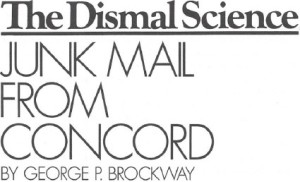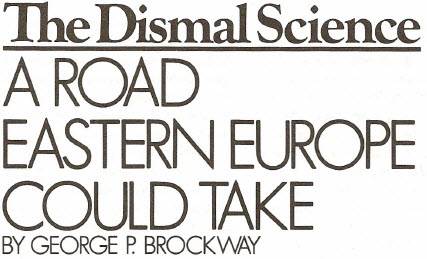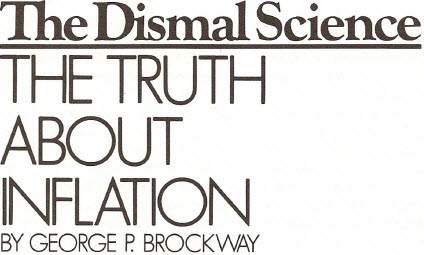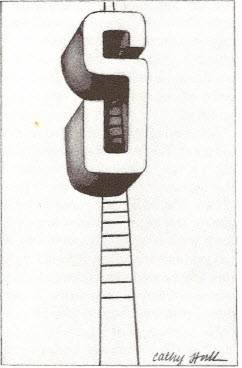By George P. Brockway, originally published November 7, 1994
I’M ON A NEW mailing list, and I suppose you are too. The soliciting organization calls itself the Concord Coalition, and it seems to be the plaything of former Senator Warren B. Rudman, Republican of New Hampshire, and former Senator Paul E. Tsongas, Democrat of Massachusetts.
If I didn’t know anything about the two ex-Senators and had to judge them solely by the mailing piece, I would have difficulty deciding whether they are extraordinarily stupid or extraordinarily slick. Either way, they are dangerous, and are likely to make the next few years less pleasant than we might have found otherwise.
Let’s talk about the slickness first, because that’s more fun. Their bag is deficit reduction. In his “Dear Friend” letter to me, Mr. Rudman writes, underlined, “Our goal is nothing short of changing public opinion to demand less, not more, deficit spending and force the elimination of the deficit.”
Now, if you read that quickly, you may get the idea the Coalition is out to lobby the President and Congress to do something about the deficit. But that can’t be its intention. The letter asks me for a “special tax-deductible dues contribution,” and so far as I know, you cannot get a tax exemption for your organization if you are planning to lobby the Legislature. Common Cause doesn’t have tax exemption, nor does the Council on Foreign Relations, nor the National Association of Manufacturers nor the National Organization for Women nor the National Rifle Association nor the Academy of American Poets nor the American Automobile Association.
Some of the organizations on my little list play pretty hard ball, but most of them do not back candidates, and it is impossible to say with a straight face that the Concord Coalition is less “political” than they are. Either the Coalition is led by a couple of mighty shrewd lawyers, or is encouraging violation of the law right off the bat. They are cute enough, however, to add in a postscript that “contributions are tax-deductible to the extent permitted by law.” (Personal subscriptions to THE NEW LEADER are also tax-deductible “to the extent permitted by law,” which, I regret to say, is not to any extent at all.)
And that’s not the worst of it. The bookkeeping reason for the deficit is that our expenditures are too high and our taxes are too low. The Coalition proposes that tax collections be reduced by the amounts otherwise payable on the contributions they receive. By its very existence it is increasing the deficit it is complaining about. If that isn’t cynicism, what is it?
It may be stupidity.
But I doubt it. Both Mr. Rudman and Mr. Tsongas are grown men, and they are both (I think) lawyers. They have both spent a lot of time thinking about taxes, and presumably they both can add and subtract. Rudman also makes a point of the fact that “the hundreds of hours that Paul and I are putting into the Concord Coalition are strictly on a volunteer basis.” Not to worry. They are both entitled (I think that’s the word) to comfortable government pensions, complete with cost-of living adjustments (aka COLAS), not to mention better health insurance than you will ever see. Besides, if theirs truly is a tax-exempt organization, their expenses of running hither and yon to appear on talk shows are deductible. But not otherwise, although the expenses might be legitimate charges against whatever contributions they manage to collect.
Well, that’s all good for a chuckle or two in this winter of our discontent[1]. But what will happen to the economy if the Concord Coalition gets its way won’t be very amusing. And given the results of the recent election, one would be ill-advised to bet it won’t succeed without even trying.
So let’s look at the deficit. The estimate for 1995 (the fiscal year that started last October 1) is $176.1 billion. That’s down substantially from the $220.1 billion deficit of fiscal year 1994. In relation to the Gross Domestic Product, it is the smallest deficit we have had since 1979. But it is still a lot of money.
Suppose that, by constitutional amendment or otherwise, the whole deficit could be wiped out. What would become of all that money? Would you and I get refunds for our share of it? Or would the government deposit it where it could earn interest – say, in a Texas savings and loan bank (if any survives)? Or would it be stashed away in Fort Knox? Or could we use it to pay off our trading debts to the Germans and the Japanese? Or to buyback the bonds they have bought from us? Or would it be an advance payment on the following year’s budget?
The correct answer, of course, is, None of the Above. And the reason for the answer is that all those billions do not exist, because as I’ve said before, and say again here in a minute, money is debt. Not only does the money not exist, the goods and services the money was budgeted to buy do not exist, either. Maybe you and I did not want those goods and services, anyhow.
Maybe we thought it was wasteful to spend money on them. Even so, we had better stop a minute to consider what their nonexistence means to the economy – that is, to us.
First off, we can’t cut government expenditures by $176.1 billion without firing people. And they won’t all be lazy, faceless bureaucrats, because the Federal government is not only the nation’s largest employer, it is the nation’s largest purchaser of stuff produced by the private sector. (Where did you think the paper for the paperwork comes from?)
The point is that the people who will lose their jobs are fellow citizens; so when we talk about the number of them, we should never forget that they are ordinary people like you and me. The number is very large. I estimate it at 3,785,631, which I arrive at as follows: (1) The way the pie is cut in our economy today, labor gets about two thirds of it, and two thirds of$176.1 billion is $117.4 billion. (2) The median income of full-time workers in the United States is $31,012. (3) Divide (1) by (2) and you get 3,785,631 new recruits for the army of the unemployed, the great majority of them obviously from the private sector.
That should push our total unemployment over 10 million. In fact, when you consider the lost purchasing power of those 3.7 million people, and the lost business of those who used to sell to them, there is little doubt that trimming $176.1 billion from the Federal budget will enable us to set a new post-Depression unemployment record, not to mention anew record for relief expenses.
I know, of course, the answer Messrs. Rudman and Tsongas would make to the foregoing, because I have heard Newt Gingrich touting a balanced budget amendment that would codify the problem. They’d say cutting $176.1 billion out of the Federal budget would so stimulate the private sector, overjoyed to get all that government off its back, that it would forget it had ever coined the word “downsizing[2]” and would invest and expand its businesses to take up the slack and then some.
I would not be surprised if the private sector talked that way; but I would be astonished if it acted that way, because when business people forget about politics and mind their businesses, they are not quite so stupid as they sometimes sound. If they are not already investing and expanding, there would be no reason for them to change course if the deficit is cut. Taxes won’t be a reason; the deficit is caused because taxes do not cover expenditures now. Budget balancing won’t be accomplished by lightening up that side of the scales. Besides, the only taxes likely to be cut are capital gains taxes; that will be dandy for speculators, but it will do nothing good for producing entrepreneurs and will probably increase the interest they have to pay. (I forgot:
There is likely to be an attempt to get a cut for the middle class, too, meaning people with adjusted gross incomes over $250,000.)
No, I think we can expect downsizing to continue, no matter what is done with the budget.
AS CONSTANT readers know, I’m a mild-mannered chap; so I find it difficult to believe the Concord Coalition is just another Trojan Horse. If they are really naive instead of slick or stupid, their naiveté goes pretty deep into their misunderstanding of economics. They don’t begin to understand money and its role in the capitalist system.
They have possibly never wondered where the Federal Reserve notes in their pockets came from and what makes them worth more than the paper they are printed on. They have possibly never looked closely at a dollar bill. It says right on its face, “This note is legal tender for all debts, public and private.” What does that mean? It means that it was issued by the government in payment for some good or service, and that, in the end, the government will take it back in payment of some fee or tax. In the meantime, the government owes a dollar to whoever holds the note. It is an acknowledgment of debt.
In the capitalist system, not all debt is money, but all money is debt. If the Concord Coalition gets rid of the $176.1 billion deficit, that much of the money supply will be washed out. Now, if business is to continue merely at its present sluggish pace, the $176.1 billion will have to be replaced from somewhere. Since it seems unlikely that private business will kick its downsizing habit any time soon (why should it, with GATT on the horizon?), state and local governments will have to pick up the slack and go deeper into debt to the tune of $176.1 billion. Needless to say, slumping Federal services will force them to do some of that, anyhow. Deficit reduction turns out to be a scam shifting some Federal burdens to the states, probably (I regretfully suspect) in the expectation that the burdens will be either fumbled or financed with a regressive sales tax.
As you will no doubt remember from “In Pursuit of a Fiscal Fantasy” (NL, 6/14-28/93), the government can be in debt forever and ever, issuing new bonds to pay off those that come due. The only thing it has to be able to do is pay interest on the loans, and that would be no problem at all if the Federal Reserve Board were at least moderately committed to the national welfare. Most of the Fortune 500 companies, and indeed almost all companies of every size, are constantly rolling over their debt this way. Capitalism is a system based on borrowing and lending.
You and I could do the same if we were immortal. As it is, we don’t hesitate to go into debt to provide our family with a better place to live and to give our children the best education possible. Would we have done our children a favor if we had not made the commitment, even though some of the debt may still be unpaid at our death?
On reflection, you have to say that the Concord Coalition is not only slick but stupid.
The New Leader
[1] Ed. – Which raises the question, what did the Shakespearean data base administrator say when he found snow in his VTOC?
[2] Ed. – we recommend you read this when considering “downsizing”: http://wp.me/p2r2YP-hx







